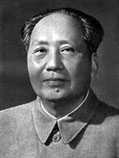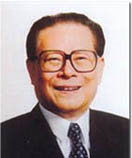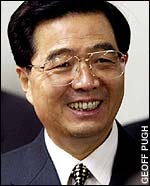WELLESLEY COLLEGE Political Science 208
Politics of China
Fall 2004
Professor William A. Joseph
PNE 232, x2201
Office Hours: T 1:30-3:00; W 9:30-12:15
and by appointment
This course is an introduction to the modern political history and contemporary political system of China. The emphasis is on China's political development; i. e. the changing structure, use, and distribution of power in China from the middle of the 19th century to the present.
Topics include the fall of imperial China, the origins, development, and victory of the Chinese Communist revolution; the rule and legacy of Chairman Mao Zedong, particularly the Great Leap Forward and the Cultural Revolution; economic reform, cultural opening, and political repression (especially the Tiananmen crisis) in the era of Deng Xiaoping; and the evolution of Chinese politics in post-Deng China. Politics in Tibet, the Muslim areas of China, Hong Kong, and Taiwan will also be considered as time allows. Although the focus of the course is on China's domestic politics, close attention will be paid to the influence of international factors on China's development and part the last sessions of the course will look at China's role in the world.
The written assignments for the course, tentative due dates, and weights in the final grade are as follows:
- A take-home mid-term exam (open book) (25%): Monday, October 25.
- An 8-10 page research paper (35%): Wednesday, November 24 [before Thanksgiving Break]
- A self-scheduled final exam (closed book) (40%): December 15-21.
NOTE: For the two in-term assignments, you may have a total of 5 days of "extensions" to use as best fits your schedule. This will allow you to hand in the assignment after the due date without a grade penalty. But after the 5-day grace period has been used up the assignment will be marked down 1/3 grade per day (or fraction of a day) late (e. g. from B+ to B).
Attendance, Attentiveness, & Participation will be taken into account when assessing the final grade. Please see the list of "Responsibilities and Expectations" attached at the end of this syllabus.
The following books (all paperback) are available for purchase in the bookstore. They are also on reserve in the library.
- John K. Fairbank and Merle Goldman, China: A New History, 2nd edition.
- Jung Chang, Wild Swans: Three Daughters of China.
- Timothy Cheek, Mao Zedong and China's Revolutions
- Huang Shu-min, The Spiral Road: Change in a Chinese Village Through the Eyes of a Communist Party Leader, 2nd edition.
- Current History, "China and East Asia," September 2004.
Video assignments are a very important part of this course, so you should take them just as seriously as the reading. The assigned videos are all on reserve in the Knapp Center. If possible, common showing times will be arranged.
Students are also expected to keep up with current events in China. The New York Times and The Washington Post both do a pretty good job of covering news from China. Daily editions of these papers are available on-line. For other suggested sources for news about China, see China Politics Links, which is accessible via the course conference on FirstClass and the instructor's homepage. The first 10 or so minutes of class each Friday will be spent discussing current events.The issues discussed during this time and current events in general will be part of the final exam.
COURSE SCHEDULE AND READING ASSIGNMENTS: Assignments marked (ER) are available via Electronic Reserve in the FirstClass Conference for this course. Assignments marked (OL) are "on-line" and can be accessed via the course syllabus on the instructor's homepage by clicking on the relevant link or through the On-line Readings folder in the course FirstClass Conference. Items marked (R) are on reserve in the library. The readings are listed in the order in which it is recommended that they be done.
Part I: Starting Points
Sept. 7 Introduction to the Course & the Study of Chinese Politics
Recommended Reading:
- "China On My Mind," Richard C. Levin, President, Yale University, June 2001.
- "Rulers of the Middle Kingdom," CNN.com.
- "In China, Ancient History Kindles Modern Doubts," Erik Eckholm, The New York Times, 11/10/00.
- "Battle for History," Matt Forney, Far Eastern Economic Review, May 14, 1998.
Sept. 10 Language, Geography, & 2,225 Years of Chinese History
- Fairbank & Goldman, China: A New History, Introduction and ch. 1.
- Edwin O. Reischauer, "The Dynastic Cycle." (ER)
Part II: From Empire to People's Republic
Sept. 14, 17 Imperial China: The Glue is the Clue
- Fairbank & Goldman, chs. 2, 4.
- Albert Feuerwerker, "Ideology as a Unifying Element" and "Emperor and Bureaucracy: The Political Order," in State and Society in Eighteenth Century China. (ER)
- Emperor Qianlong's Letter to King George III (1793). (OL)
- Lloyd E. Eastman, "Agriculture: An Overview," in Family, Fields, and Ancestors: Constancy and Change in China's Social and Economic History, 1550-1949. (ER)
- Huang Shu-min, The Spiral Road, pp. 1-5.
- Suisheng Zhao, "The Decline of the Chinese World Order," in Power Competition in East Asia, pp. 15-25. (ER)
Sept. 21, 24 Imperial China: Things Fall Apart
- Fairbank & Goldman: chs. 6-9.
- Suisheng Zhao, "The Decline of the Chinese World Order," pp. 26-31. (ER)
- Digital China/Harvard, "The Opium War," (Browse the site, but be sure to read Commissioner Lin's Letter to Queen Victoria). (OL)
- Required video: "The Two Coasts of China" (1 hour) Knapp Reserve DS518.8 .P32 1992 (also available from the instructor).
- Recommended video:"The Opium War" (feature film produced in China in 1997;153 minutes) Knapp Reserve PN1997 .Y2735 1997.
- Recommended browsing: Jonathan D. Spence & Annping Chin, The Chinese Century: A Photographic History of the Last 100 Years, ch. 1. (R).
Sept. 28, Oct. 1 The Five Rs: Rebellion, Restoration, Reform, Reaction, & Revolution
- Fairbank & Goldman, chs. 10-14.
- John E. Wills, Jr., "Hong Xiuquan, The Heavenly King," in Mountain of Fame: Portraits in Chinese History. (ER)
- Lucien Bianco, "Social Causes of the Revolution," in The Origins of the Chinese Revolution, pp. 83-107. (ER)
- Jung Chang, WILD SWANS, ch. 1-2.
Oct. 5, 8, 12 Civil War, World War and [more] Civil War
- Fairbank & Goldman, chs. 15-17.
- Timothy Cheek, Mao Zedong and China's Revolutions, pp.1-13, 183-192.
- Mao Zedong (Mao Tsetung), "Report on the Peasant Movement in Hunan" (1927) in Cheek, pp. 41-75.
- Jung Chang, WILD SWANS, ch 3-7.
- Edgar Snow, "The Long March," Part 5, in Red Star Over China. (ER)
- Michael Schaller, "The United States Confronts the Chinese Revolution, 1942-49," in Schaller, The United States and China in the Twentieth Century. (ER)
- Required video: "China in Revolution" (2 hours) VHS: Knapp Reserve DS774 .C45 1989; DVD: Knapp Reserve DS774 .C44 2001. Also available from instructor.
- Recommended browsing: Spence & Chin, The Chinese Century, chs. 2-7. (R)
Oct. 15 Mao & Maoism
- Cheek, pp. 13-18; 193-204.
- Mao Zedong (Mao Tsetung):
PART III: Mao in Power (1949-1976)
- Required video: "The Mao Years" (2 hours). (R) VHS: Knapp Reserve DS777.55 .M36 1994; DVD: Knapp Media DS774 .C44 2001. VHS also available from instructor. To be viewed sometime during Part III of the course.
Oct. 19 Consolidation and Transformation (1949-55)
- Fairbank & Goldman, ch. 18 (343-359).
- Huang, Intro. (pp. 5-9), chs. 1-3.
- Zhou Yongming, "Nationalism, Identity, and State-Building: The Antidrug Crusade in the People's Republic, 1949-1952," in Brook & Wakabayashi (eds.), Opium Regimes: China, Britain, and Japan, 1839-1952. (ER)
- Chang, chs. 8-9.
- Cheek, pp. 18-21.
- Mao Zedong:
- "The Chinese People Have Stood Up!" in Cheek, pp. 125-127.
Oct. 22: Fragrant Flowers and Poisonous Weeds (1956-57)
- Fairbank & Goldman, ch. 18 (359-367)
- Chang, chs. 10-11.
- Cheek, pp. 21-24.
- Mao Zedong
- On the Correct Handling of Contradictions...," parts I, II, VIII, IX, X, in Cheek, pp. 127ff.
Oct. 26, 29: The Great Leap Forward...Backward...and Rightward (1958-1964)
- Fairbank & Goldman, ch. 19.
- Cheek, pp. 24-26.
- Mao Zedong, "Talk at the Beidaihe Conference," in Cheek, pp. 160-166.
- Huang, ch. 4-5.
- Chang, chs. 12-14.
- Jasper Becker, "Anhui: Let's Talk About Fengyang," in Hungry Ghosts: Mao's Secret Famine. (ER)
- Li Zhisui, The Private Life of Chairman Mao, in Cheek, pp. 204-210.
Nov. 2, 5, 12 Mao's Last Stand: The Cultural Revolution (1966-1976)
- Fairbank & Goldman, ch. 20.
- Cheek, 26-36, 167-179, 210-231.
- Mao Zedong, "Talks with Mao Yuan-hsin [Yuanxin]" (OL)
- Huang, chs. 6-7.
- Chang, chs. 15-27.
- Li Zhisui, The Private Life of Chairman Mao (excerpts), pp. 80 (para. 4) - 90. (ER)
- Harry Harding, "The Legacy of Mao Zedong," in Harry Harding, China's Second Revolution. (ER)
- Required browsing:
- Recommended videos: "Wild Swans" (59 minutes) (Knapp Reserve DS774 .C37182 1990); "The Morning Sun" (On order)
- Recommended browsing: Spence & Chin, The Chinese Century, chs. 8-10. (R) and Li Zhensheng, Red-Color News Soldier (R-Knapp
DS778.7 .L52 2003)
PART IV: The Transition to Market-Leninism (1977--present)
Nov. 16, 19: Deng Xiaoping in Power: Reform and Repression
- Fairbank & Goldman, ch. 21, Epilogue.
- Chang, ch. 28 and Epilogue.
- Deng Xiaoping:
- Orville Schell, et. al. “The Tiananmen Square Demonstrations and the Beijing Massacre,” in Schell and Shambaugh, eds. The China Reader: The Reform Era. (ER)
- Andrew Nathan & Perry Link, The Tiananmen Papers (excerpts) from Foreign Affairs.
- Required Video: "Tragedy at Tiananmen" (1 hour) (R-Knapp; also available from the instructor).
- Recommended video: "The Gate of Heavenly Peace" (3 hours) (R)
- Recommended browsing: Spence & Chin, The Chinese Century, chs. 11-12. (R)
Nov. 23, 30: Economic Reform: How Much Change! - William A. Joseph, "China," in Kesselman, Krieger, & Joseph, eds., Introduction to Comparative Politics, 3rd ed., Section 2. (ER)
- Huang, chs. 8-12.
- Current History, Sept. 2004, Article by Gilboy & Heginbotham.
- Required Video: "China in the Red"; watch at least 5 or 6 of the segments of your choice. (R-Knapp HC427.95 .C447 2003; also available for on-line viewing at: http://www.pbs.org/wgbh/pages/frontline/shows/red/.)
- TBA
Dec. 3, 7 Political Reform: How Much Change?Dec.10 Current Challenges & Future Scenarios - Joseph, ch. 5. (ER)
- Current History, Sept. 2004, Articles by Kurlantzick, Sutter, Canning.
- Michael Swaine, "Trouble in Taiwan," in Foreign Affairs, March-April 2004. (ER)



